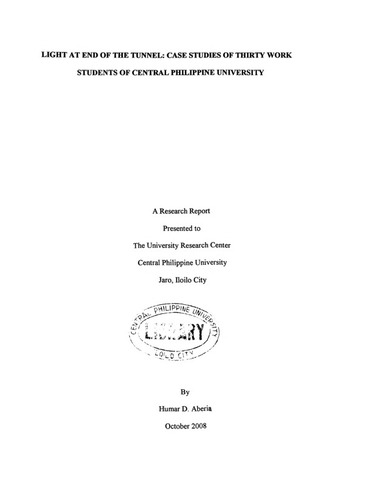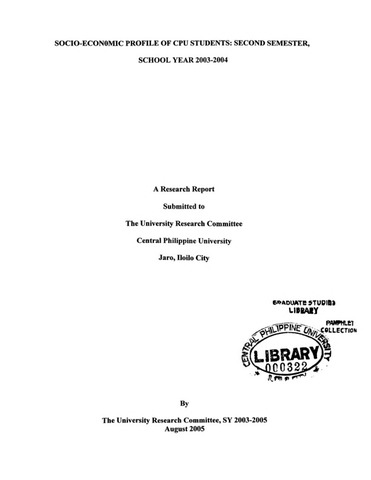Ipakita ang simpleng tala ng item
Light at the end of the tunnel: Case studies of thirty work students of Central Philippine University
| dc.contributor.author | Aberia, Humar D. | |
| dc.date.accessioned | 2021-05-12T05:17:02Z | |
| dc.date.available | 2021-05-12T05:17:02Z | |
| dc.date.issued | 2008-10 | |
| dc.identifier.citation | Aberia, H. D. (2008). Light at the end of the tunnel: Case studies of thirty work students of Central Philippine University (Research report). Jaro, Iloilo City: University Research Center, Central Philippine University. | en_US |
| dc.identifier.uri | https://hdl.handle.net/20.500.12852/860 | |
| dc.description | Abstract only | en_US |
| dc.description.abstract | This descriptive investigation attempted to study in-depth thirty work students of the University in terms of their personal and family backgrounds, economic condition, relationship with people, problems encountered and what they hope to accomplish after graduation from college. Data for this investigation were gathered from work students assigned in four work areas: Janitorial, Clerical, Library, and Service and Laboratory from June 6, 2008 to October 20, 2008 using a nine section interview schedule and an eight section interview guide. The instruments were face and content validated. Quantitative data gathered were analyzed using means and percentages and presented in frequency distribution tables which serve as introduction to the thirty case studies. Qualitative data gathered were structurally analyzed and presented as case studies. Result of the investigation showed that the respondents are 20.2 years old on the average, enrolled in different courses in six colleges of the University. Most are females, come from rural areas, belonging to families with 7.23 members on the average, and assigned in the Service and Laboratory section of the University. Most respondents live in their own house with water sealed toilets, and standing on housing lot which their family used for free. The family’s average monthly income of Php. 4,050.00 is not enough to meet their financial needs which is why family members work to augment the income of the family. Most of respondents’ parents still live under one roof, are very liberal with their children, where sibling to sibling and sibling to parent relationship is very close. Incidents which threaten to split the family make the respondents cry or angry while personal accomplishment and those which maintain peace and harmony within the family make them laugh. Of respondents who stay in boarding houses, one half stay for free while the rest pay their bedspace when needed. Respondents are very friendly to their boardmates, very close to their work supervisor and the opposite sex, and do not have any lovelife as of the moment. There are respondents who go to school on an empty stomach without any money in their pocket. Many respondents still work outside the University for them to have a place to stay and fill their stomach while working and studying at the University. The respondents have many aspirations for their family, themselves and their community after they graduate from college and find employment | en_US |
| dc.format.extent | iii, 67 leaves | en_US |
| dc.language.iso | en | en_US |
| dc.publisher | Central Philippine University | en_US |
| dc.subject.ddc | GSL 301.72 Ab37 | en_US |
| dc.subject.lcsh | Central Philippine University | en_US |
| dc.subject.lcsh | Central Philippine University--Students | en_US |
| dc.subject.lcsh | Part-time students | en_US |
| dc.subject.lcsh | College students | en_US |
| dc.subject.lcsh | Part-time students--Social conditions | en_US |
| dc.title | Light at the end of the tunnel: Case studies of thirty work students of Central Philippine University | en_US |
| dc.type | Technical Report | en_US |
| dcterms.accessRights | Limited public access | en_US |
| dc.description.bibliographicalreferences | Includes bibliographical references | en_US |
| local.subject | Central Philippine University (CPU). Work Student Study Program. | en_US |
| local.subject | Work students | en_US |
Mga file sa item na ito
Lumilitaw ang item na ito sa mga sumusunod na (mga) Koleksyon
-
Research reports [42]
-
Research reports [167]





